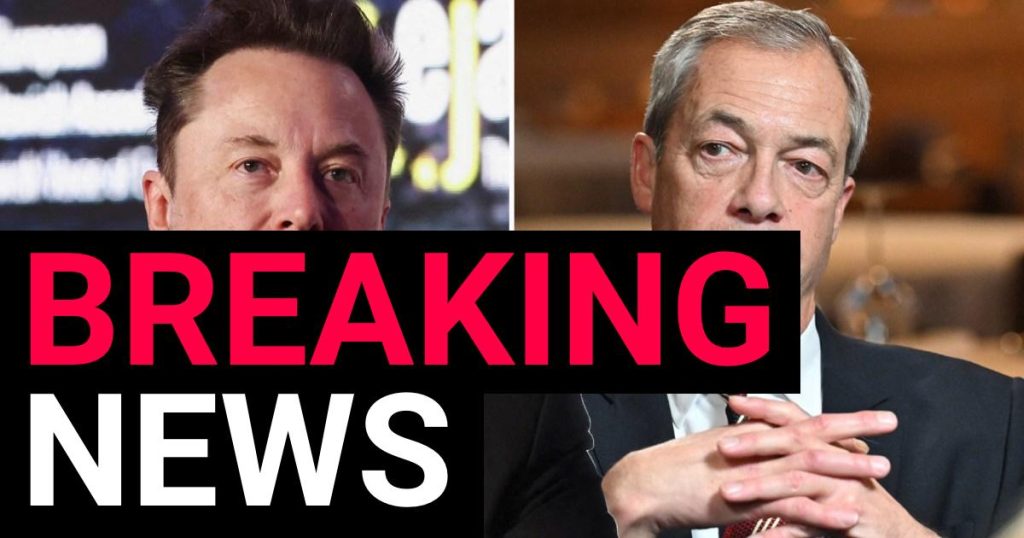Elon Musk’s foray into British Politics: A Critique of Reform UK Leadership and Allegations against the Labour Party
Elon Musk, the world’s richest individual and a prominent figure known for his ventures in technology and space exploration, has recently turned his attention towards the landscape of British politics. His engagement, primarily through the social media platform X (formerly Twitter), has stirred controversy and sparked debate regarding his influence and the accuracy of his pronouncements. Musk’s recent pronouncements have focused on Reform UK, a right-wing populist political party in the United Kingdom, and the Labour Party, one of the UK’s two major political parties.
One of the focal points of Musk’s commentary has been Reform UK, led by Nigel Farage. Despite having previously expressed interest in the party and hosting Farage and Reform UK treasurer Nick Candy at his Mar-a-Lago residence, Musk has publicly criticized Farage’s leadership. In a succinct post on X, Musk declared, "The Reform Party needs a new leader. Farage doesn’t have what it takes." This statement, devoid of further explanation, has generated speculation about the underlying reasons for Musk’s disapproval of Farage’s leadership.
Simultaneously, Musk has levelled serious accusations against the Labour Party, particularly linking them to a "rape gang scandal." He alleges that the Labour Party is obstructing a national inquiry into the issue due to their complicity in the crimes. These accusations, which have significant implications for public trust and political accountability, have been met with strong reactions from the Labour Party and other political figures. Health Secretary Wes Streeting, in an interview with Sky News, characterized Musk’s comments as "misjudged and certainly misinformed," emphasizing the seriousness of the issue and the need for collaborative efforts rather than accusatory rhetoric. Streeting expressed a willingness to work with Musk, acknowledging the potential of his social media platform in addressing the issue.
Musk’s engagement with British politics is not entirely unprecedented. In November 2023, he was a notable guest at then-Prime Minister Rishi Sunak’s AI summit. This prior involvement suggests a pre-existing interest in the political landscape of the UK. However, his recent pronouncements, particularly his public critique of Farage and his allegations against the Labour Party, mark a more direct and potentially divisive intervention in British political affairs.
The context of Musk’s pronouncements within the broader political landscape is crucial. Reform UK, a relatively new party, has been trying to establish itself as a significant political force. Musk’s initial interest and subsequent criticism of its leadership could have notable implications for the party’s trajectory. His allegations against the Labour Party, if substantiated, could have serious repercussions for the party’s reputation and public support. However, if unsubstantiated, they could be interpreted as politically motivated and potentially damaging to public discourse.
The response from the Labour Party through Wes Streeting reflects a measured approach, acknowledging the potential value of collaboration with Musk while firmly rejecting the accuracy of his accusations. This response highlights the delicate balance between engaging with influential figures like Musk and defending against potentially misleading or damaging claims. The unfolding dynamics between Musk, Reform UK, and the Labour Party will likely be a significant feature of the British political landscape in the coming months.
Musk’s criticism of Farage’s leadership style lacks specificity, leading to conjecture about his motivations and criteria for effective leadership. Does he believe Farage’s populist approach is ineffective or detrimental to Reform UK’s long-term prospects? Is his criticism based on personal interactions, policy disagreements, or broader strategic considerations? The absence of explicit justification allows for various interpretations and potentially fuels speculation.
Furthermore, Musk’s accusations against the Labour Party raise serious concerns about the responsible use of social media platforms in disseminating information and shaping public opinion. Accusations of complicity in serious crimes, especially those involving vulnerable populations, should be substantiated with credible evidence and due process. Musk’s pronouncements, delivered through a social media platform with immense reach, have the potential to significantly impact public perception without providing the necessary context or evidence for verification.
The Labour Party’s response, while emphasizing a willingness to collaborate with Musk on combating child exploitation, also underscores the need for accountability and factual accuracy in public discourse. Their invitation to Musk to "roll his sleeves up" suggests a desire to move beyond rhetoric and engage in constructive action to address the issue. This response seeks to balance acknowledging Musk’s influence while upholding the importance of evidence-based policy and responsible communication.
The unfolding situation highlights the complex interplay between social media, political figures, and the public. Musk’s engagement with British politics, while potentially bringing attention to important issues, also raises concerns about the potential for misinformation and the erosion of trust in established institutions. The long-term consequences of his interventions, both for Reform UK and the broader political landscape, remain to be seen. The situation calls for critical evaluation of information disseminated through social media and emphasizes the importance of holding public figures accountable for their pronouncements.


